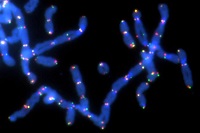 Researchers at the NYU Langone School of Medicine say they're on the trail of what may turn out to be a new class of therapies for blocking the growth of BRCA1 and BRCA2-linked tumor cells.
Researchers at the NYU Langone School of Medicine say they're on the trail of what may turn out to be a new class of therapies for blocking the growth of BRCA1 and BRCA2-linked tumor cells.
Agnel Sfeir, a cell biologist at NYU Langone, says research into the tips of telomeres found at the ends of chromosomes led to an enzyme called polymerase theta, or PolQ. The enzyme spurs what the researchers call an "unwanted" fusion, inserting segments of DNA into a DNA repair pathway dubbed alt-NHEJ, which created coding errors.
Blocking that enzyme had a dramatic impact in the growth of cancer cells. The study was published in Nature.
"It was quite remarkable to find that by blocking PolQ action, cancer cell growth was cut by more than half," says Sfeir.
The investigators narrowed their search of suspect enzymes after noting that PolQ is present in a number of tumors, particularly in breast and ovarian cancer.
"Our studies will continue to look at how the alt-NHEJ pathway operates," Sfeir adds, "and what biological factors cells use in addition to PolQ to choose between the error-prone or error-free DNA repair pathways."
- here's the release
- get the research abstract